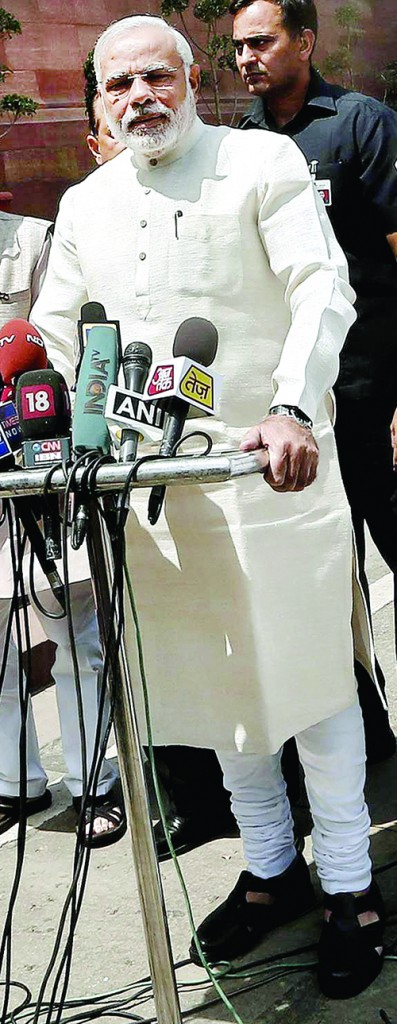Sunday Times 2
Kudankulam plant attains ‘full capacity’
View(s):NEW DELHI, June 07 (AFP) – The first reactor of India’s largest nuclear plant — dogged by protests and multiple delays — reached full

Prime Minister Narendra Modi (C) speaks to the media as he arrives to attend his first Parliament session in New Delhi June 4. REUTERS
capacity for the first time today, an official said.
The Russian-backed Kudankulam plant, in the southern state of Tamil Nadu, is designed to help meet surging demand for electricity in Asia’s third-largest economy where blackouts are frequent.
“It’s really an emotional experience for us,” said R.S. Sundar, site director of the state-run Nuclear Power Corp of India, according to The Hindu newspaper’s website.
Work was completed on the 1,000-megawatt (MW) first unit last year and the second 1,000-MW reactor is expected to be brought into service by mid-2014, despite local protests delaying construction.
Plans for the Kudankulam facility were first drawn up in 1988. It was supposed to open in 2011 but large, often violent protests, by residents worried about the possibility of a nuclear accident delayed the startup.
Opponents of the plant, which lies on the same coastline devastated by the 2004 Asian tsuname, say it is located in a seismically sensitive area and fear a Fukushima-style disaster could kill thousands.
The plant is one of many India hopes to build as part of its aim of generating 63,000 megawatts of nuclear power by 2030 — a planned near 15-fold rise from current levels, according to the Nuclear Power Corp.
| Japan visit a boost for Abe
NEW DELHI, June 07, (AFP) – India’s new Prime Minister Narendra Modi will likely visit Japan next month, the foreign ministry said, in a boost for Tokyo as it looks to shore up regional alliances and counter an increasingly assertive China. Modi, whose Hindu nationalist Bharatiya Janata Party won a landslide victory in May’s elections, is set to make his maiden foreign trip as premier to neighbouring Bhutan later this month. Foreign ministry spokesman Syed Akbaruddin said that while the (South Asian) “neighbourhood remains India’s priority”, Japan has offered to host Modi soon and he will likely take up the invitation in July. The world is closely watching Modi’s first moves as leader of the world’s biggest democracy, and a visit would be a boost for Japanese Prime Minister Shinzo Abe as he seeks to raise Asian support to counter China’s increasing regional assertiveness. New Delhi, like Tokyo, has a long-running territorial dispute with Beijing, whose growing military confidence is causing disquiet in Asia and beyond. China is in a row with Japan over ownership of several islands in the East China Sea, and at odds with India over a long-running border dispute that flared into a brief war in 1961. The United States, Japan’s key ally, is concerned about China’s growing economic and military clout and would welcome a closer relationship between New Delhi and Tokyo, which geographically bookend Beijing. Trade between India and Japan has steadily increased over the last decade, with the pair signing a free trade pact in 2011. Modi swept to power on a pledge to invigorate India’s sluggish economy, whose more-than-billion-strong population promises a huge potential market. With its decrepit roads and other infrastructure, India is also a natural market for Japan’s huge infrastructure firms and has been the recipient of frequent development aid and loans. Japanese media had suggested that Modi could visit as early as this month, with the increasingly precarious Asian security situation high on the agenda, along with a potential deal on nuclear power technology. “Prime Minister Abe has invited new Prime Minister Modi to visit Japan, and the two countries are making final adjustments for that,” Japanese government spokesman Yoshihide Suga told reporters in Tokyo on Friday. Abe and Modi exchanged friendly greetings on Twitter after his landslide win. The new Indian leader visited Japan twice before coming to power, in 2007 and in 2012. |

